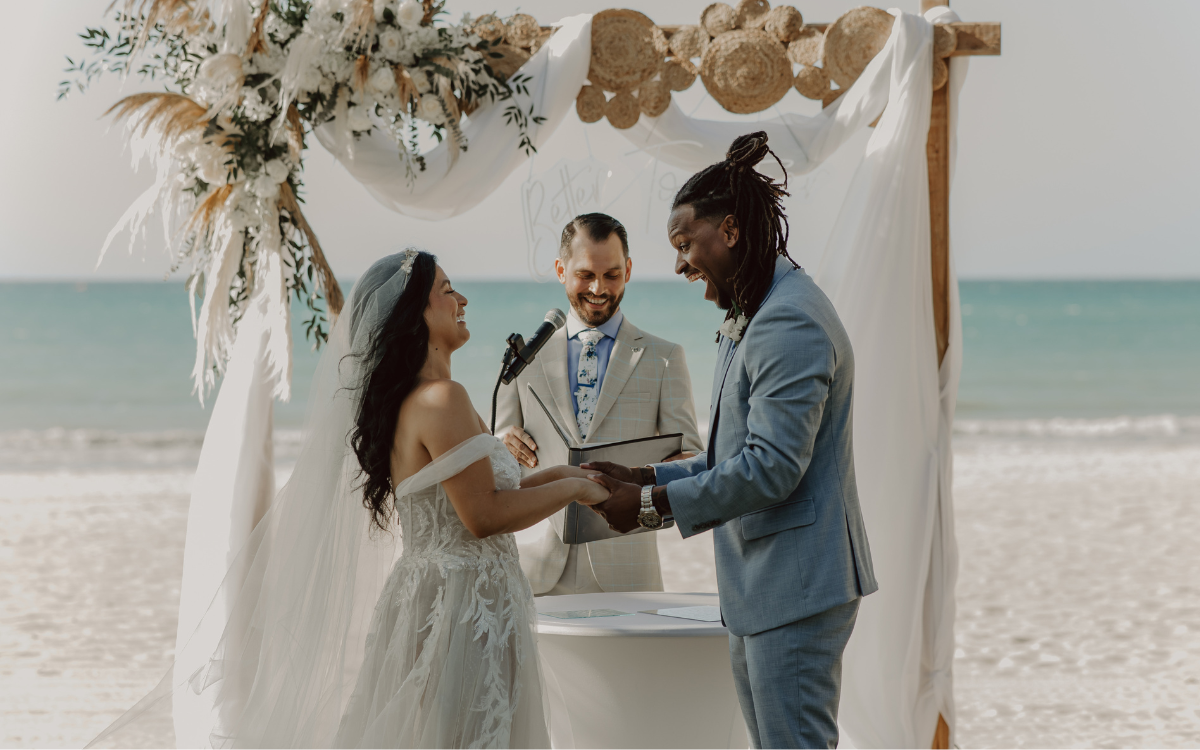Getting married soon and wondering, “can a licensed minister perform weddings?” Looking for someone to officiate your special day?
Becoming a licensed minister can allow you to perform legal wedding ceremonies for friends and family.
This guide covers everything you need to know about becoming ordained and legally marrying couples according to state laws.
We’ll explain the quick and easy process, legalities, and how to start officiating weddings as soon as possible.
How to Become a Licensed Minister

Becoming a licensed minister is a straightforward process that can usually be completed in a few quick steps. The easiest route is to get ordained online through a non-denominational ministry organization. These groups will provide legal ordination for a small fee, granting you the authority to officiate weddings.
With your licensing documentation, you can then register with the county clerk’s office to officiate ceremonies in your state. Requirements vary, but the online ordination path allows anyone to become a wedding officiant quickly and legally.
Legal Requirements for Performing Weddings
Once ordained, you’ll need to follow some key legal steps to officiate weddings in your state. Requirements vary, but generally involve registering with the county clerk’s office and obtaining a local marriage license.
Some states may require additional steps like completing an application, paying a fee, or filing your ordination credentials.
Be sure to follow all regulations – the county clerk can provide guidance. With the proper licensing in place, you can legally officiate wedding ceremonies. Just be sure to maintain current credentials and keep copies of your ordination and registration documents on hand.
Registering as an Officiant in Your State

After getting ordained, the next step is registering with your state or county to officiate weddings legally. Requirements vary by location, but often include filing paperwork, paying a fee, and providing a copy of your ordination certificate.
Some counties may require additional steps like completing a civil celebrant application or passing a background check. Be sure to check with your county clerk’s office to learn the specifics for your area.
Once approved, you’ll receive documentation to perform legal wedding ceremonies. Keep this on hand when officiating, as couples will need it for their marriage license. Regularly verify your registration status too, since credentials may need to be renewed annually.
With the proper licensing in place, you can officiate weddings in your state as an online-ordained minister.
Creating a Wedding Ceremony as an Officiant
Officiating a wedding involves more than just showing up on the big day. You’ll want to meet with the couple beforehand to discuss the vision for their ceremony and tailor your services accordingly.
Consider their religious beliefs, cultural traditions, venue, wedding theme and other personal touches they wish to incorporate. Offer sample scripts and readings to choose from, but encourage creativity too.
Recommend adding meaningful poems, songs or personal vows. Outline the general flow of the ceremony and logistics like processionals.
Rehearse tricky name pronunciations and line up any readings with other participants. Draft your ceremony script to reflect all these details. And on the wedding day, exude a warm, confident and professional presence as you lead the couple and guests through each moment.
With thoughtful preparation and personalization, you can craft and conduct a unique ceremony that the newlyweds will fondly remember.
Handling Paperwork and Documentation
An important part of officiating a wedding is properly completing and submitting all the necessary paperwork. This ensures the marriage is legal and documented. Be sure to find out the marriage license requirements for the state and county where the ceremony will take place.
Often the couple needs to apply for and bring the license to the ceremony. Review it closely to make sure all information is accurate before signing.
After the ceremony, you must finalize the license by adding additional signatures and filing it with the county clerk per the deadline. Keep copies for your records too. You may also need to provide the couple with a completed certificate of marriage.
Stay organized and pay close attention to important paperwork details so the newlyweds don’t have to worry about the legalities on their special day.
Best Practices for Officiating a Wedding

When officiating a wedding, it is important to keep some best practices in mind. First, make sure you are legally able to perform marriages in the state where the ceremony will be held.
Review the marriage license and ceremony script ahead of time. Arrive early to the venue to connect with the couple and wedding party. Dress professionally in attire fitting for the formality of the event.
When it is time for the ceremony, speak slowly and clearly into the microphone if using one. Make frequent eye contact with the couple and guests.
Radiate warmth, joy and enthusiasm as you guide the couple through their vows. Avoid long, rambling speeches unrelated to the couple. Keep things focused on them and their love story. Allow the couple to customize portions if desired, such as including cultural or religious traditions.
Provide ongoing guidance as needed during the planning process. Follow up after the honeymoon to see how they are settling in as newlyweds. Taking these steps will ensure an organized, personalized ceremony the couple will fondly look back on.
FAQs About Legally Performing Weddings
Many questions come up for those looking to officiate weddings. First, make sure you check the laws in the state where you’ll perform the ceremony. Requirements vary, with some states allowing online ordinations while others mandate formal credentials. If ordained online, ensure it is with a reputable non-profit. Also look into municipal regulations, as some cities require separate licensing.
Once legally able, you’ll need to understand the marriage license process. Work with the couple to ensure proper timing submitting the license before the big day. Afterwards, follow the precise rules on signing and returning the completed license to the county. The couple relying on you to dot the i’s and cross the t’s.
Beyond the legalities, couples will want to know your experience and style. Be ready to describe your past ceremonies and approach to creating a meaningful, personalized service. Share reviews and testimonials if available. Also highlight any unique offerings like premarital counseling or rehearsal dinners.
Most of all, convey your sincere excitement to be part of their special day. Your passion for bringing people together in love will shine through. This FAQ overview helps you knowledgeably address common questions on legally officiating weddings.
Tips for Starting Your Wedding Officiant Business
Looking to turn your wedding officiant services into a business? First, get clear on your niche. Will you specialize in certain traditions, faiths, or types of ceremonies? Define your ideal client. Pricing should reflect your expertise and experience level. Consider tiered packages too.
Networking remains key, so get active in wedding industry groups and local chambers of commerce. Create a website highlighting your services, values and personality. Optimize with SEO best practices. Don’t forget polished business cards for in-person connections.
Social media provides another way to spread the word. Share photos and testimonials. Post about why you love officiating. Offer wedding planning tips. Stay responsive to inquiries.
As your reputation grows, focus on exceeding expectations. Arrive early, overprepared. Add special touches like personalized vows or readings. Follow up for reviews to build social proof. Soon your passion for bringing couples together will turn into a thriving wedding officiant venture.
People Also Asked (FAQs)
Who can officiate a wedding in the US?
In most states, ordained ministers, judges, justices of the peace, and other authorized officials can legally officiate weddings. Requirements vary by state.
Can anyone officiate a wedding in Wisconsin?
Yes, Wisconsin allows anyone to officiate a wedding as long as they complete and file a “Declaration of Intent to Marry” form with the county clerk prior to the wedding. No ordination is required.
Who can perform a marriage in Georgia?
In Georgia, ordained ministers, judges, justices of the peace, and notaries public can perform marriages. Georgia does not allow self-uniting marriages.
Who can perform a wedding in Missouri?
In Missouri, ordained or licensed clergy, judges, and some other civil officials are authorized to perform weddings. Missouri also allows self-uniting marriages.
Conclusion
Marriage officiant laws vary by state. In most states, ordained ministers and certain civil officials like judges can perform weddings. Some states allow anyone to officiate with proper paperwork. Overall, it is important to check specific state laws to see who can legally officiate a wedding ceremony. A licensed minister is generally authorized to perform weddings in most states.

